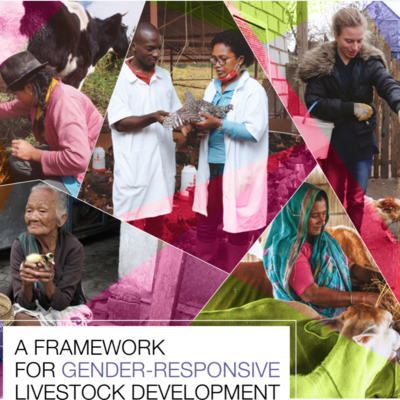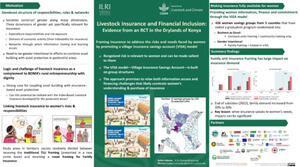
ILRI gender scientists facilitate a training workshop on ‘gender in agricultural research’ in Mozambique
 On 11-13 March 2014, International Livestock Research Institute (ILRI) gender scientists in the Livelihoods, Gender and Impact program, Kathleen Colverson and Alessandra Galie, took the lead in facilitating a workshop on “Promoting Equal Access to Resources and Opportunities in Agriculture for Men and Women”. The training workshop was held at the Agricultural Research Institute of Mozambique (IIAM) in Maputo, and was funded by the United States Agency for International Development (USAID) through Modernizing Extension and Advisory Services (MEAS). This was in response to a perceived need to strengthen the capacity of agricultural scientists and extensionists in Mozambique to address gender in their work, especially in projects supported by USAID.
On 11-13 March 2014, International Livestock Research Institute (ILRI) gender scientists in the Livelihoods, Gender and Impact program, Kathleen Colverson and Alessandra Galie, took the lead in facilitating a workshop on “Promoting Equal Access to Resources and Opportunities in Agriculture for Men and Women”. The training workshop was held at the Agricultural Research Institute of Mozambique (IIAM) in Maputo, and was funded by the United States Agency for International Development (USAID) through Modernizing Extension and Advisory Services (MEAS). This was in response to a perceived need to strengthen the capacity of agricultural scientists and extensionists in Mozambique to address gender in their work, especially in projects supported by USAID.
Using ILRI’s gender training manual as the main basis of the training, a total of thirty participants were taken through the main steps of gender analysis and introduced to basic gender analysis tools (refer to the manual and presentation here). The facilitators employed a mix of methods including interactive PowerPoint presentations, role plays and mainly group discussions on case studies to deliver the training.
A timely intervention
The training workshop comes in the wake of an increased push by the gender team at ILRI to increase gender capacity within the CGIAR, its partners and value chain actors. This is also one of the outputs of the gender strategy of the CGIAR research program on Livestock and Fish. Some of the concerns raised by the participants in relation to gender research included their in-ability to explain the concept to colleagues, how to integrate the tools in their wok and which gender-related indicators to use for monitoring and evaluating progress as well as for reporting to donors. From the participants’ reflections of the three-day training, the importance of understanding gender analysis as part of a longer-term learning cycle was identified as most important.
The workshop revealed several concrete examples of the need for on-going training, technical assistance, and collaborative learning for participants:
• Greater depth in understanding of gender-related concepts
• Elaboration and use of gender indicators
• Learning about new gender tools and approaches
• Incorporation of participatory approaches
• Integrating gender in the project cycle
• Need to build capacity of teams, rather than individuals
• Expand attention to gender in extension
• Create a community of practice in the context of Mozambican agriculture
The Mozambique workshop is just one of the many capacity building trainings scheduled for this year!


















